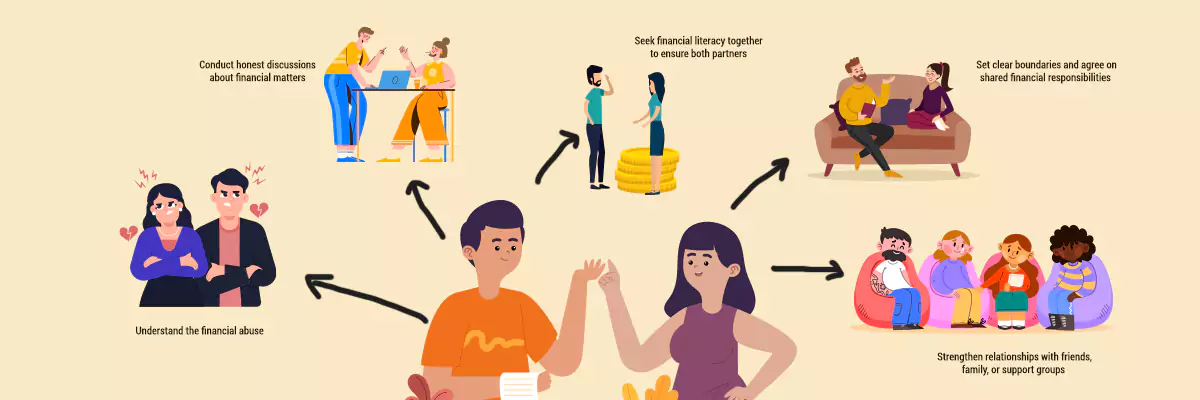About Financial Abuse in Marriage
Financial abuse is a tactic often used by one partner to control the other in a relationship. It involves actions such as hiding information, restricting access to assets, or limiting the spouse’s involvement in family finances. This form of abuse, along with emotional and physical abuse, consists of deliberate actions to manipulate, intimidate, and threaten the partner, trapping them in the relationship. Importantly, research indicates that financial abuse is a factor in 99% of domestic violence cases. Moreover, financial abuse in marriages may persist throughout the entire relationship or manifest when the survivor is in the process of leaving.
Understanding Financial Abuse and its Forms
Financial exploitation is, indeed, a type of family violence. It can affect anyone. Accordingly, financial abuse in marriages is a distressing form of mistreatment. This form of abuse can take various shapes, consequently causing both emotional and economic harm to the partner. Understanding financial abuse and its different forms is crucial for recognizing and addressing this pervasive issue.
Similarly, like other types of abuse, financial abuse or money control might start slowly and get worse with time. Sometimes, it’s hard for people to notice it. Additionally, the ones doing the abuse can seem really nice and good at tricking others. Abusers use different tricks to control their partner’s money. Here are some common ones:
- Hiding money and things.
- Not letting the partner work.
- Blocking the partner from getting job training or promotions.
- Deciding how all the money gets spent.
- Keeping the partner out of money decisions and bank stuff.
- Not letting the partner use bank accounts.
- Holding back money or only giving a small amount.
- Messing up job opportunities by bothering them at work or making them lose their job.
- Building up a lot of debt on shared accounts.
- Taking or forcefully getting the partner’s identity or inherited belongings, such as dowry.
- Making the partner work in the family business without pay.
- Not paying bills and ruining the partner’s credit.
Understanding these tricks is important to help stop financial abuse and support those going through it.
How to Identify Financial Abuse in a Relationship?
To identify financial abuse , pay attention to signs of control and unfair treatment with money. Specifically, if your partner dominates all money decisions, limits your access to accounts, or keeps a close eye on your spending, these could be significant red flags. In particular, these actions might show that your partner is trying to control and manipulate your money.
Additionally, be aware if they prevent you from working, create problems at your job, or force you into financial activities you’re not comfortable with. Accordingly, financial manipulation might involve giving you very little money or withholding funds needed for daily things.
Nevertheless, it’s essential to understand your partner’s behavior or approach. It might be their natural way, not necessarily economic manipulation. They could be trying to protect you from potential losses or have different views on handling money. Consequently, sometimes, one partner might be inclined to spend, while the other wants to save for the future. Recognizing these differences in financial styles is crucial to avoid misinterpreting normal differences as financial exploitation.
Solutions and Steps to Take

- Recognize the signs and understand that financial abuse is not acceptable in a healthy marriage.
- Do open and honest discussions about financial matters, goals, and concerns.
- Seek financial literacy together to ensure both partners are well-informed and empowered.
- Set clear boundaries and agree on shared financial responsibilities and decision-making.
- Strengthen relationships with friends, family, or support groups to counteract isolation.
- Consider seeking professional help from counselors or therapists to navigate challenges.
- If necessary, create a plan to ensure the safety and well-being of both partners.
- In severe cases, consult legal professionals to understand and protect your rights.
Impact of Financial Abuse
Financial exploitation or money control really hurts people. It doesn’t just mess up money. Also, it makes people feel powerless and alone. Moreover, the partner who is going through this often gets super stressed and anxious because they can’t control their finances. Additionally, it doesn’t just stop there. It also messes with how they feel about themselves, making it hard to feel strong and independent again. Plus, financial abuse in marriages can mess up important things like housing, education, and healthcare.
Last Thoughts
In conclusion, many people stay in these relationships because they feel stuck. Moreover, they worry about taking care of themselves and their kids. Getting out of financial abuse might need careful thinking and help. First, remember to focus on staying safe. Subsequently, prioritize taking care of yourself and your children. Additionally, find ways to be financially independent as you navigate through this challenging period.
In closing, let’s discuss some questions.
- What do you think about financial abuse in marriages?
- Are you experiencing financial abuse in relationships or your marriage?
- Has anyone you know, like friends or family, dealt with it?
- If so, what solutions have you found?
- Do you think the solutions mentioned above would be helpful?
Feel free to share your thoughts and experiences in the comments.


Who knew money could be such a tricky partner? Great read with a serious message. Thanks for the awareness!
Great blog! Informative and eye-opening. It’s good to raise awareness about this issue. Thanks for shedding light on such an important topic.
I visit every day some sites to read content, however your website presents quality based posts. Every time I visit, there is always something interesting to discover. Keep it up Simple rishta!
It’s refreshing to see such an important topic being discussed openly, especially on a Pakistani website where these conversations often go unnoticed. Thank you for bringing attention to this issue and for providing valuable information that can help others recognize and address financial abuse. Keep up the fantastic work!